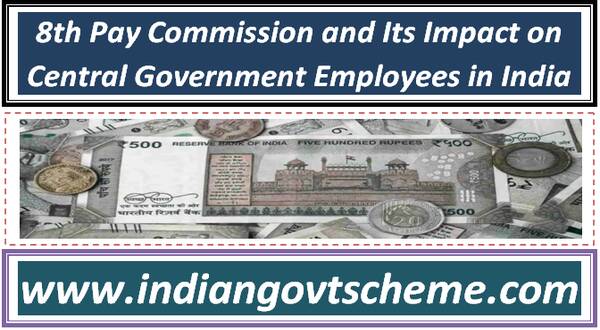8th Pay Commission and Its Impact on Central Government Employees in India
The impending implementation of the 8th Pay Commission, scheduled for January 1, 2026, represents a pivotal moment for central government employees and pensioners in India. Approved on January 16, 2025, this commission is anticipated to affect over 50 lakh employees and approximately 65 lakh pensioners by revising salaries, pensions, and allowances significantly.
Key Features of the 8th Pay Commission
Core Focus Areas:
The commission will primarily concentrate on evaluating salary and pension adjustments, with particular attention given to critical elements such as the fitment factor and minimum wage standards. These adjustments are intended to ensure that compensation packages reflect current economic conditions and cost of living changes.

Pending Terms of Reference:
Despite the approval of the commission, the government has yet to release the Terms of Reference, which delineate the specific guidelines and objectives the commission will pursue. This absence of information leaves many stakeholders eager for clarity on the commission’s scope and priorities.
Financial Implications:
Although Budget 2025 introduced several proposals benefiting taxpayers, it did not address the financial repercussions associated with the implementation of the 8th Pay Commission. This raises concerns regarding how the government will manage the anticipated increase in expenditure related to salary and pension revisions.
Significant Proposal: Consolidation of Pay Scales
A prominent proposal from the Staff Side advocates for the consolidation of lower pay scales to promote equitable compensation and enhance career growth opportunities. The proposed mergers include:
- Level 1 with Level 2
- Level 3 with Level 4
- Level 5 with Level 6
Currently, a Level 1 employee earns a basic pay of Rs 18,000, while a Level 2 employee receives Rs 19,900. Following the proposed merger, Level 1 employees may experience more significant benefits, especially with potential increases derived from a projected fitment factor of up to 2.86. This could elevate the revised basic pay to approximately Rs 51,480.
Importance of the Fitment Factor
The fitment factor plays a crucial role in recalibrating salaries and pensions across all levels, ensuring standardized pay increases regardless of an employee’s grade or pay band.
Under the 7th Pay Commission, the minimum basic salary rose dramatically from Rs 7,000 to Rs 18,000, largely due to a fitment factor of 2.57. This adjustment also led to substantial pension increases, elevating them from Rs 3,500 to Rs 9,000.
While the specific fitment factor for the 8th Pay Commission has not been officially announced, projections suggest it may be around 2.5. This could result in significant salary increases, with potential earnings rising from Rs 40,000 to as much as Rs 1,00,000, depending on the multiplier applied and the employee’s grade pay.
Conclusion
As millions of central government employees and pensioners await the outcomes of the 8th Pay Commission, the focus on equitable compensation and career advancement through proposals like pay scale consolidation underscores a commitment to creating a fair and transparent salary structure. The deliberations and decisions made during this process will have lasting implications for government employee compensation in India, aligning it with contemporary economic realities and enhancing the overall well-being of the workforce.
नोट :- हमारे वेबसाइट www.indiangovtscheme.com पर ऐसी जानकारी रोजाना आती रहती है, तो आप ऐसी ही सरकारी योजनाओं की जानकारी पाने के लिए हमारे वेबसाइट www.indiangovtscheme.com से जुड़े रहे।
